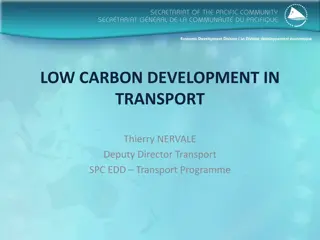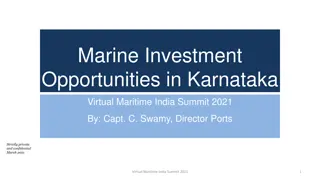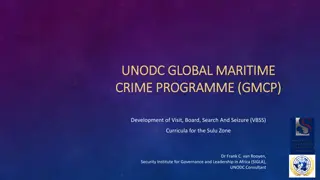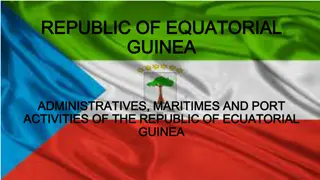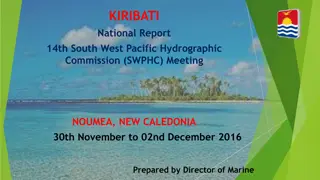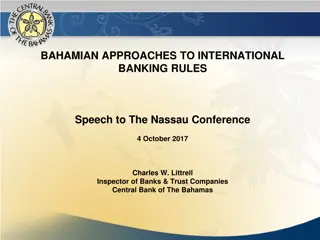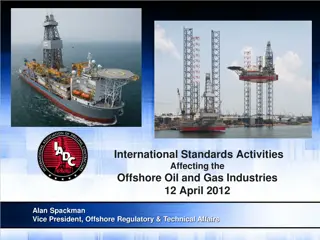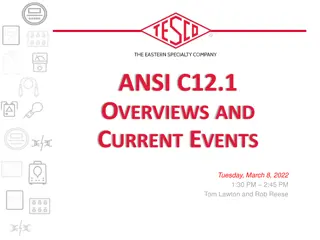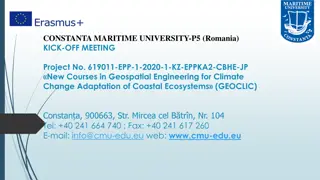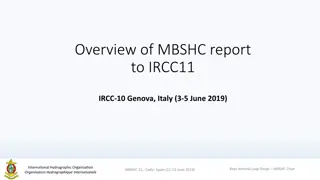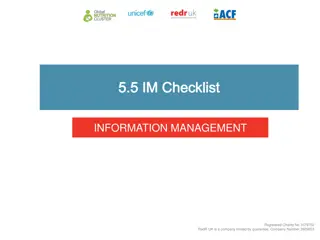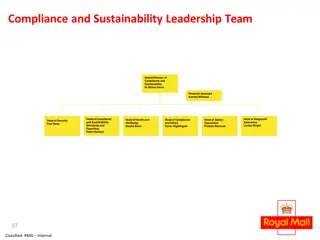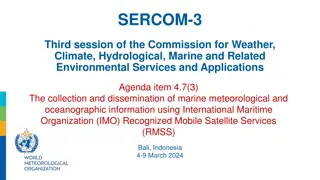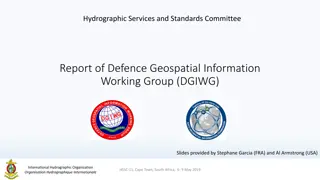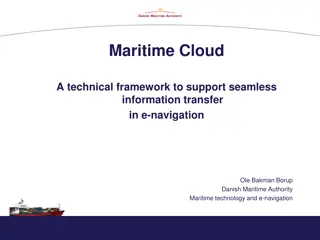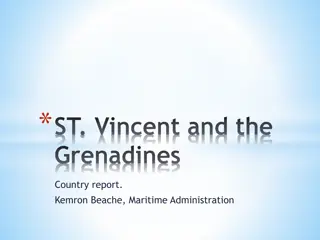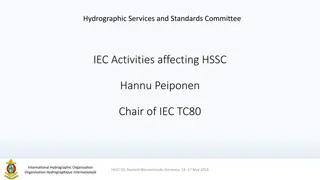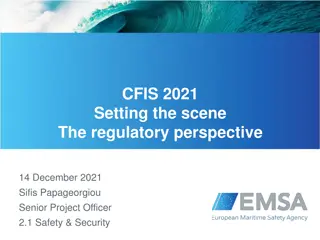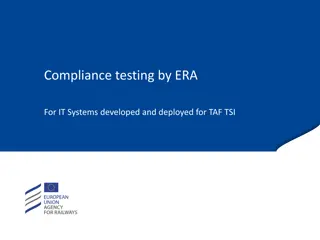International Maritime Organization (IMO) and IMSAS: Ensuring Compliance with Maritime Standards
The International Maritime Organization (IMO) plays a crucial role in promoting maritime safety, protecting the marine environment, enhancing maritime security, and ensuring the human element in shipping. Through the Instrument Implementation Code (III Code) and the Voluntary IMO Member State Audit Scheme (VIMSAS), now mandatory as the IMSAS, the IMO monitors and enforces compliance with international maritime standards. Actors such as governments, recognized organizations, shipping companies, and shipboard personnel all have essential roles in upholding these standards. While the IMO Convention itself does not grant enforcement powers, efforts are ongoing to enhance its authority for greater transparency and accountability.
Download Presentation

Please find below an Image/Link to download the presentation.
The content on the website is provided AS IS for your information and personal use only. It may not be sold, licensed, or shared on other websites without obtaining consent from the author. Download presentation by click this link. If you encounter any issues during the download, it is possible that the publisher has removed the file from their server.
E N D
Presentation Transcript
15th South West Pacific Hydrographic Commission Conference 21 22 February Nadi, Fiji Francesca Pradelli Policy and Legal Officer / Pacific Safety of Navigation Project Manager GeoScience, Energy and Maritime (GEM) Division Pacific Community (SPC)
INTERNATIONAL MARITIME ORGANIZATION (IMO) What does it do? Maritime Safety Marine Environment Maritime Security Human element Facilitation Technical Cooperation IMSAS
IMSAS: BACKGROUND AND PURPOSE Scope Actors IMO role in monitoring and enforcement Background and Evolution of IMSAS Audit Standards
IMSAS: BACKGROUND AND PURPOSE ACTORS in ensuring compliance with international maritime standards 1. IMO 2. GOVERNMENTS - have the duty to implement and enforce these standards; 3. RECOGNIZED ORGANIZATIONS - have a duty to be impartial and 4. SHIPPING COMPANIES - responsible for applying the same standards to individual ships; and 5. SHIPBOARD PERSONNEL - have the task of putting into operation the various safety and anti-pollution measures applicable to the ship. - develop technical safety, security and pollution prevention standards related to maritime transport; exercise due diligence;
IMSAS: BACKGROUND AND PURPOSE IMO role in monitoring and enforcement The IMO Convention does NOT contain any provision that gives the Organization an enforcement and monitoring role With the drive for greater transparency and accountability, it has often been said that IMO needs teeth to ensure compliance How to achieve that, is emerging gradually
IMSAS: BACKGROUND AND PURPOSE Background and evolution of IMSAS From 2002 IMO has been working on approaches for performance measurement through VIMSAS (2005-2013) when the scheme was then voluntary, and starting from January 2016 it has become mandatory and known as IMSAS Two main documents to be used in IMSAS (i) The Audit Framework and Procedures - Res. A.1067(28) (ii) IMO Instruments Implementation Code (III Code) Res. A.1070(28) Supporting reference document (iii) 2015 Non-exhaustive list of obligations under III Code A.1105(29)
Framework & Procedures (Resolution A.1067(28)) 1. FRAMEWORK 1. Purpose 2. Application 3. Audit Standard 4. Vision Statement 5. Objective 6. Principles 7. Scope 8. Responsibilities 9. Technical Cooperation
Framework & Procedures (Resolution A.1067(28)) 1. FRAMEWORK Purpose - to describe the objective, principles, scope, responsibilities and capacity-building aspect of the IMO Member State audit, which together constitute the strategy for the audit scheme. This Framework is supported by the Procedures for the IMO Member State Audit and the IMO Instruments Implementation Code (III Code)
Framework & Procedures (Resolution A.1067(28)) 7. Scope IMO Instruments (i) (ii) (iii) (iv) (v) (vi) - related to the areas listed below; safety of life at sea, prevention of pollution from ships, standards of training, certfication and watchkeeping for seafarers , loadlines, tonnage measurement of ships, and regulations for preventing collisions at sea. the applicable IMO instruments
Framework & Procedures (Resolution A.1067(28)) 7. Scope Obligations & Responsibilities - those contained in the applicable IMO instruments provided such instruments have entered into force for the Member State, in its capacity as a flag, port and coastal state. Areas to be covered by the audit -Member State s implementation and enforcement of applicable IMO instruments in its legislation, the effectiveness of its control and monitoring mechanism, etc ..
Audit Scheme Sequence of Activities Responsible Activity Procedures Reference 1. All MS informed of overall audit schedule SG 4.1.1 2. PAQ sent to MS SG 5.1 3. Completed PAQ returned to IMO MS 5.4 4. Selection of Auditors by IMO SG 4.4 5. Notification of auditors to MS SG 4.5.5 6. Final selection of audit team SG + MS 4.4.1.; 4.5.5 7. Developing and negotiating the MoC, including authorization release of the audit reports to the public or MS 8. MoC finalized and signed SG + MS (FW 8.2.4) 4.2.1 ; 4.2.3 MS + SG 4.2.2 9. Preparation for the audit by the audit team ATL Section 5 (various ref) 4.2.4 ; 4.2.5 ; 5.7 10. Agreeing the Audit Plan ATL + MS
Responsible Activity Procedures Reference 11. Opening Meeting between Audit Team and MS ATL + MS 6.3 12. The Audit AT 6.4 13. Audit Closing Meeting ATL + MS 6.5 14. Draft Interim Report and draft Executive Summary Reports sent to MS for comments ATL 7.1.3 ; 7.2.2 ; 7.3.1 ; 7.3.2 15. Review of draft IR and draft ESR, including comments by MS ATL + MS + IMO 7.1.3 ; 7.2.3; 7.2.4 ; 7.3.1 16. Agreed IR and ESR sent to MS ATL 7.2.1 ; 7.3.1 17. Executive Summary Report released SG (FW 6.3.3 ; 6.3.4) 7.3.1 18. Member State s Corrective Action Plan as appropriate sent to ATL and IMO MS 7.2.1 ; 7.4.1 ; 8.4 19. Draft Audit Final Report sent to MS and IMO AT 7.4.2 ; 8.5 20. Member State s comments on the progress of implementation of Corrective Action Plan sent to IMO MS 7.5.1 21. Audit Team Leader s Mission Report sent to IMO ATL 7.6.1 22. Feedback from MS sent to IMO MS 7.7.1 23. Corrective Action Plan presented to ADT and SG within 90 days after receipt of agreed Audit Interim Report MS 8.4 24. Corrective Action Plan released SG 8.5 26. Audit Follow Up, as appropriate SG 9.1
III Code (Resolution A.1070(28)) The Code is divided into 4 Parts; Part 1 Common Areas Part 2 Flag States Part 3 Coastal States Part 4 Port States
III Code (Resolution A.1070(28)) Part 1 Common Areas 1 : Objective (para 1 2) Enhance global maritime safety and protection of the marine environment An Administration is only bound by the instruments to which it is Party Different circumstances in different States
III Code (Resolution A.1070(28)) Part 1 Common Areas 2 : Strategy (para 3) A State is recommended to: Develop an overall strategy to ensure that its international obligations and responsibilities are met; Establish a methodology to monitor and assess that the strategy ensures effective implementation and enforcement of relevant international mandatory instruments; and Continuously review the strategy to achieve, maintain and improve the overall organizational performance and capability
III Code (Resolution A.1070(28)) Part 1 Common Areas 3 : General (para 4-5) Treaty law (UNCLOS) is not an IMO mandatory instrument, it is an "umbrella convention" The Audit is to be carried out against relevant mandatory IMO instruments and NOT against UNCLOS
III Code (Resolution A.1070(28)) Part 1 Common Areas 4 : Scope (para 6) The Code seeks to address those aspects necessary for a Contracting Government or Party to give full and complete effect to the provisions of the applicable international instruments to which it is a Contracting Government or Party, pertaining to: safety of life at sea; prevention of pollution from ships; standards of training, certification and watchkeeping for seafarers; load lines; tonnage measurement of ships; and regulations for preventing collisions at sea.
Part 2 Flag States Part 3 Coastal States 1 : Implementation 2 : Delegation of authority 3 : Enforcement 4 : Flag State surveyors 5 : Flag State investigations 6 : Evaluation and review 1 : Implementation 2 : Enforcement 3 : Evaluation and Review Rights, obligations and responsibilities may include, inter alia: radiocommunication services meteorological services search and rescue services hydrographic services ships' routeing ship reporting systems vessel traffic services aids to navigation Part 4 Port States 1 : Implementation 2 : Enforcement 3 : Evaluation and Review
SPC REGIONAL ASSISTANCE IN PREPARATION FOR IMSAS first Regional Workshop on the Implementation of IMSAS Suva (Fiji), 21 to 25 September 2015 1. attended by representatives from Cook Islands, Fiji, Kiribati, Papua New Guinea, Samoa, Solomon Islands, Tuvalu and Vanuatu 2. main objective 3. outcome: roadmap to facilitate PICs effective preparation for IMSAS (19 steps)
NATIONAL ASSISTANCE IMSAS Awareness workshop 1. 2015/2016/2017 countries: Tuvalu, Vanuatu, Kiribati, Solomon Islands, Samoa 2. outcome: national roadmaps towards IMSAS Strategy to implement international instruments 1. Upon official request, SPC assisted Vanuatu, Kiribati, Solomon Islands and Samoa in developing their own national Strategy Maritime Transport Policy 1. Upon official request SPC assisted Vanuatu, Kiribati, Palau in develop their own national MTP Legal gap analysis in the scope of IMSAS 1. 4 Spreadsheets developed taking into account IMO Resolution A.1105(29) 2015 Non- Exhaustive list of obligations under instruments relevant to the IMO Instruments Implementation Code 1. Upon official request SPC conducted legal gap analysis in Vanuatu, Tuvalu, Kiribati, Samoa
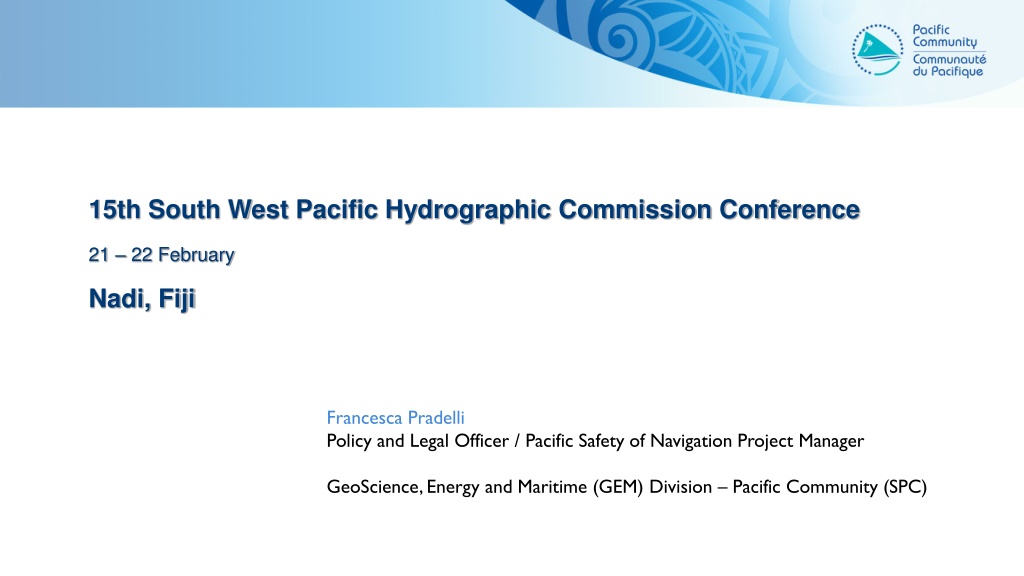
 undefined
undefined

